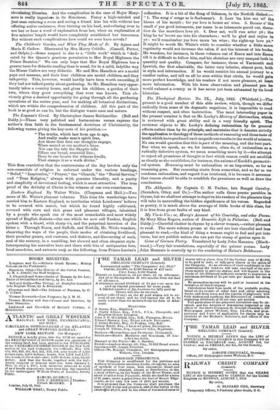The Theological Review. No. IX., July, 1865. (Whitfield.)—The present is
a good number of this able review, which, though we differ radically from some of its dogmatic negations, it is impossible to read without respect, and often instruction. The most interesting paper in the present number is that on Mr. Leoky's History of Rationalism, which is reviewed with great ability and in a very friendly spirit. The reviewer objects to Mr. Leeky's defining rationalism by its general effects rather than by its principle, and maintains that it denotes strictly the application to theologyof those methods of reasoning and those tests of truth which have produced such magnificent regalia in the world of acienee. No one would question that this ispart of the meaning, and the best part.. But when we speak, as we, for instance, often do, of rationalism as a, radically defective system, we mean something more by it—the attempt to reject all premisses of thought or fact which reason could not establis4 as clearly as she establishes, for instance, the axioms of Euclid's geometri- cal system. Reasoning mast be rationalism or an imposture, so far aa reasoning goes. But reasoning starts from somewhat, and 30 far as we condemn rationalism, and regard it as irrational, it is because it assumes that reason should be able to establish the premisses as well as draw the conclusions.






























 Previous page
Previous page